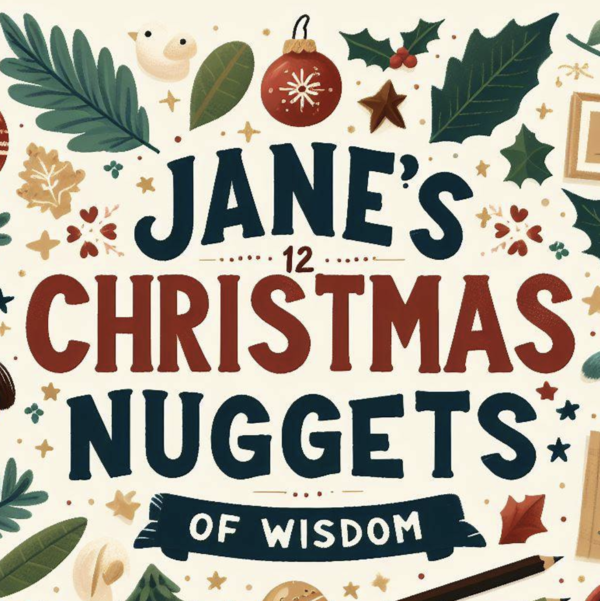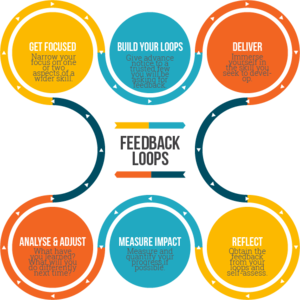Jane’s 12 Christmas nuggets of wisdom
Last week, Jane White completed the Fastlead leadership development program and had her final coaching session with me.
Jane is a senior strategic and change communications expert at South East Water in Victoria. She was an absolute joy to work with – an ideal coaching client. Jane is passionate about what she does, a dedicated lifelong learner, and willing to fully engage and be vulnerable in both small-group coaching and 1on1 coaching sessions.
At the end of our programs, we ask graduates to present their key learnings and outcomes in a skills-sharing session. Jane took a unique approach to her presentation and shared her learnings as her 12 Christmas nuggets of wisdom. It was inspiring to everyone in the room and brought a tear to my eye.
Jane graciously agreed for me to share her twelve nuggets of wisdom she has obtained from the program and the coaching. I have shared her headlines and some direct quotes, but have also expanded on them further.
Jane’s 12 Christmas nuggets of wisdom
I cast a leadership shadow over everything I do
“Now, how can my ‘shadow’ become more of an ‘aura’?”
Every single one of us is having an impact on everyone one else around us. Everything we say, how we say it, what we do and how we do it, sends an overt or implied message about us. Even how we write our emails will create impressions of who we are to people who haven’t even met us. What is your shadow? Think about how you would like people to describe you and the positive impact you want to have on the people around you, your organisation or your community. Then figure out how you can be walking, talking, living, breathing example of that every day. How would people observe this in you.
Put simply – “Be the change that you wish to see in the world.” Mahatma Gandhi
There are a lot of cool, helpful resources out there I can draw upon
“Aristotle – literally ahead of his time.”
It’s easy to be a life-long learner.
There is a world of resources already at your disposal - a multitude of books, articles, courses, YouTube videos, and mentorship opportunities within your network that can provide valuable insights.
Seek out diverse perspectives and best practices. Get into a daily or weekly routine to explore and learn from the people and resources around you. By doing so, you’ll broaden your knowledge and skills and refine your personal learning strategies. Your learning will be incremental but more sustainable and applicable.
Jane referenced a 2500-year-old resource - Aristotle’s Pyramid of Influence
There’s a template for everything!
“Effective communication, influencing, and having difficult conversations don’t just happen. By applying the various tools and templates, you can really make it easier on yourself and more effective.”
You don’t have to reinvent the wheel.
More than likely, it has been done before and is a quick Google search away. From project management, goal setting, difficult conversations, to communication strategies, templates offer a ready-made blueprint for you to trial and make your own.
Personally, I have created a small online library of templates, tools, and guidelines including meeting agendas, project plans, employee surveys, coaching tools, and my personal pride and joy – a large personal collection of recipes. As of today, 583 recipes are in my Evernote account, tagged by main ingredient, cooking difficulty, and type of dish.
By adopting templates, you not only save time but also benefit from the proven experiences of others.
Have the difficult conversation – and as early as possible!
“Postponing or procrastination is going to sap your energy and make the conversation increasingly more difficult to have.”
“Doing a bit of prep work, using the template (OFFICER model), and having the conversation as early as possible saves energy in the long run.”
Most of us hate having those confrontational conversations we know we should have. We have evolved a primal fear of being booted out of the tribe, so we avoid doing things we worry could result in us being less liked.
But healthy working relationships need healthy conversations, just like in our personal lives. Avoiding them leads to dysfunctional relationships, and if many people avoid them at work, it leads to a dysfunctional culture.
Some techniques and skills can be easily learned to structure these courageous conversations so that we can talk about feelings and emotions while making it likely that those emotions don’t get out of control such as the OFFICER model we teach in our programs.
It’s not all about me (just some of it is!)
“Using tools like the experience cube, allows you to take a step back and think about what’s going on for the other person, and how that might be impacting the situation at hand. And then move on.”
When we are in a state of stress or anxiety, it is natural to feel every negative thing that is said or done is directed at us. We have evolved to be on heightened alert when we are in fight/flight mode to identify anything else that might be deemed a threat. Whether we are aware of it or not, we start reacting like the universe revolves around us.
In her presentation, Jane referenced the Experience Cube. Using self-reflective techniques like the experience cube, allows you to take a step back and think about what’s going on for other people when it feels like they are directing their anger, frustration, disappointment, etc, at you and to think about all the other reasons why they could be acting that way which have nothing to do with you. Most of the time, it doesn’t.
One of my all-time favourite YouTube videos illustrates this powerfully – What is Water?
Let the other person speak first
“By hearing their perspective upfront, you’re challenging assumptions and also building trust and respect.”
“You’re also being curious and open to learning.”
It may be counter-intuitive, but the most powerful form of influencing is listening – genuine, empathetic, active listening. No one changes their mind if they haven’t felt they had an opportunity to share their point of view and be genuinely heard and understood.
As a leader, I have learned the hard way to always speak last. Encourage others to express their thoughts before sharing your own. Ask questions. When you allow others to speak first, you gain valuable insights into their perspectives, concerns, and ideas. By actively listening, you demonstrate respect and you enrich your understanding of the challenges and opportunities at hand. It ensures your contributions are tailored to the specific needs of your audience.
I can’t control everything
“I should limit my effort and energy to what’s within my sphere of influence and control.”
“I might have what I think are amazing ideas etc etc, but if they’re outside what I can influence, are they really worth my effort now?”
Focus your efforts and energy on what lies within your sphere of influence and control Every morning, ask yourself where you can make a real difference today, and focus on that first. By prioritizing actions that align with your sphere of influence, your efforts are directed toward areas where you can make a tangible impact. This not only maximizes your effectiveness but also prevents the dispersion of your energy into areas of needless worry.
Make purposeful choices about your valuable time. If you don’t, the universe will come rushing in and choose for you.
Don’t hide your light under a bushel!
“Consider and call on your strengths – and lead with them. It’s a truly energising and life-affirming exercise.”
As a coach, it doesn’t get any better than this – when a client finds their light and wants to let it shine.
The more authentic you are, the more influential you become. It fosters trust and credibility among those around you. People are drawn to passion and a strong sense of purpose, who know how to direct their talents on the things they believe to be important while encouraging others to get their own light from under the bushel.
However, being authentic does not mean we can sit back and not seek continual improvement. Being proud of our strengths also means being aware of gaps in our skills, knowledge, and behavior which may be dimming our light in the eyes of others.
Reflection leads to personal growth.
“THE TOTAL GAME CHANGER!”.
“While that’s all well and good, you can’t move forward unless you reflect on what it means to you.”
“I’ve started journaling on a regular basis – old school pen and a physical book. Sometimes, I cut out and stick in little sayings or insights. Sometimes, I use sharpies or coloured pencils.”
There can be no real learning without reflection. All learning is change and personal change cannot be affected without reflection.
And it has been 100% proven to me that journaling is the most powerful tool we have to support reflection that reinforces real sustained change by learning from our day-to-day experiences.
A learning journal is not a diary. It is a mechanism to focus your reflections on very specific things you are trying to learn and change. What is working, what is not, what have you learned, and therefore what will you do differently tomorrow or next week.
Establish a regular reflection routine. By consciously engaging in reflection, you improve your self-awareness, expedite your learning, and identify themes over time that will not be apparent to you at the moment.
Set myself up so I can receive and act on feedback on a regular basis.
If real learning cannot happen without reflection, then reflection cannot happen without feedback.
Asking for feedback can be uncomfortable but is critical for continually refining your skills and increasing your impact. In a previous article I shared how to build regular feedback loops. The key steps in building feedback loops are:
Get Focused - hone in on specific aspects of the wider skill or change
Build your loops - ask for constructive feedback in advance
Measure - incorporate metrics when feasible
Deliver - immerse yourself in the skill or change frequently
Reflect on your progress - get the feedback and reflect
Analyze and adjust - uncover patterns and plan your improvement
Repeat - it’s called a “loop” for a reason!
I have a great basis on which to do further work
“Sometimes I have a tendency to only focus on the negatives. This work has helped me realise that the positives I have, together with my passions, are actually a pretty cool combo!”
“I have some things I still need to work on. But I’m excited about where it’s heading.”
Strengths-based development is an approach focusing on identifying, nurturing, and leveraging your talents and abilities. Instead of fixating on weaknesses, the emphasis is placed on building upon strengths to achieve personal and professional goals.
Assuming there are no serious career blockers, there is a lot of research that suggests we get a bigger bang for our learning effort by strengthening and leveraging talents. It also tends to be more motivating.
Life-long learning may be the one skill that will never become redundant. While focusing on your passion, purpose, and talents while openly acknowledging your continuous development, you demonstrate humility and a commitment to excellence, fostering a culture of continuous improvement within your sphere of influence.
I’ve made a great start! Now how do I keep it up?
Jane’s New Year resolution – “Allow time for further development and percolation including making regular time in the new year to do further work.”
To be a lifelong learner, find your own system of learning strategies, routines, motivations, and regular checkpoints to reflect on your progress and adjust your strategies accordingly. This is crucial because it is likely your situation is continually changing too. Your approach this year may not work as well next year.
In a previous article, I wrote about Deliberate Practice, which is as much about being conscious about “how” you are learning as “what” you are learning.
Consider setting new goals and challenges to keep your skills sharp and your expertise relevant. Avoid feeling comfortable. Engage in ongoing learning and networking to stay at the forefront of industry and professional trends. Regularly congratulate yourself in your learning journal about your achievements.
And Merry Christmas, everyone!



